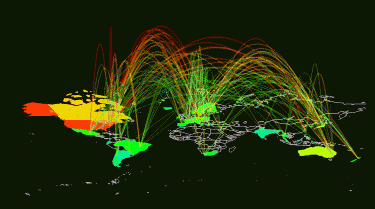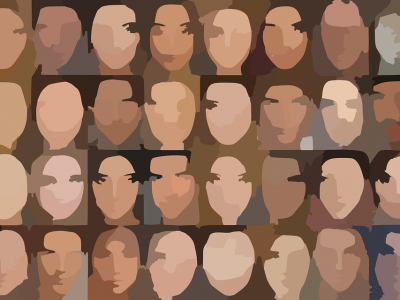
Internet traffic map. Image by Joana Breidenbach, licensed for reuse.
Most of this report was researched, written, and edited by Lisa Ferguson, Weiping Li, Alex Laverty, and Sarah Myers.
Global Voices Advocacy's Netizen Report offers an international snapshot of challenges, victories, and emerging trends in Internet rights around the world. This week, we examine a range of regulatory and legislative issues that have recently emerged in Azerbaijan, Brazil, Germany, and Ghana.
National Policy
Yahoo! Inc. has declared its support for an Internet rights bill in the Brazilian Congress. The Marco Civil da Internet seeks to protect privacy and free expression online. The bill would require Brazilian law enforcement to obtain a judicial order before it can demand Internet service providers (ISPs) comply with government requests for user data and provides a safe harbor for ISPs faced with government requests for content removal. The bill has faced several rounds of amendments over the past two years, some of which have reduced the bill's power to protect user interests, particularly in the face of copyright restrictions.
Ghana's National Communications Authority (NCA) issued fines to five telecommunications companies for providing inferior service to consumers in the country. Service was reportedly plagued by dropped calls and traffic congestion. The NCA hopes that the penalties will push the telecom companies to improve customer service, but critics worry the negligible amount of the fines will make little difference.
The Algerian government has come under criticism for continuing to postpone the adoption of 3G telecommunications standards. Activists in the country believe the government “seems intent on hiding behind the shield of one of the world’s most archaic information and communications frameworks” in order to make anti-government activism more challenging.
Censorship
India’s Supreme Court said it would investigate the validity of the nation’s Information Technology Rules, which require website owners to screen and censor specific kinds of content.
Azerbaijan’s legislature may consider a bill that would “make profanity or libel on the web a crime” according to Net Prophet. If the bill passes, citizens could be punished with up to three years in prison for libelous statements made online.
Thuggery
The Ethiopian Supreme court upheld the conviction of journalist and blogger Eskinder Nega, who was arrested in 2011 on terrorism-related charges. Nega, who frequently wrote about politics and human rights violations in Ethiopia, now faces 18 years in prison. Last year the UN Working Group on Arbitrary Detention issued an opinion stating that his conviction was in violation of international law.
Surveillance
Mozilla Foundation, creator of the Firefox browser, has issued a cease-and-desist letter to Gamma International Ltd., demanding that the British spyware company stop misleading Internet users by attaching fake Firefox information to its FinFisher surveillance software. A report by the Citizen Lab indicates that Gamma misrepresented FinFisher as being affiliated with Firefox in order to gain users’ trust in the face of recent spyware attacks in Malaysia and Bahrain.
The US Department of Commerce has fined UAE distribution company Computerlinks FZCO US$2.8 million for its role in the illegal sale of Blue Coat Proxy SG Internet surveillance software to the Syrian government. The sale violated US sanctions that prohibit surveillance technology companies from selling certain products to Syria. The Syrian government has reportedly used Blue Coat to filter websites, block Internet access, and target dissidents. Blue Coat is believed to have been unaware that the distributor intended to re-export the product.
Copyright
The Trans-Pacific Partnership (TPP) trade agreement between the US and nine Pacific Rim nations, mainly in Latin America and Asia, may pose a serious threat to the domestic copyright laws of its participants. The TPP would effectively allow the US to export some of its most stringent copyright laws to participating countries, including a ban on breaking digital locks on devices and creative works, increasing minimum copyright term lengths, privatization of infringement enforcement, and seizure of equipment allegedly used to commit infringement, to name a few.
Sovereigns of Cyberspace
The Electronic Frontier Foundation (EFF) released ‘Who Has Your Back? 2013,’ its annual scorecard for Internet communications technology companies that measures their commitment to protecting user privacy from infringement by law enforcement and other government agencies. Sonic.net and Twitter were the only two companies to score six stars out of six, while LinkedIn, Google, Dropbox, and SpiderOak came in close second at five stars. Apple, AT&T, and Yahoo received just one star each, while Verizon was the only company that received zero.
Internet Governance
The Internet Corporation for Assigned Names and Numbers has announced the opening of a new hub in Istanbul, Turkey to cover operations in Africa. ICANN plans to spread its operations beyond it current headquarters in Los Angeles to Istanbul and Singapore to become increasingly international in its outlook. China
Cybersecurity
It was reported this week that British-owned defense contractor QinetiQ to the US suffered repeated hacking attacks by the Chinese government hacking unit known as the Comment Crew. From 2007 to 2010, the hackers reportedly obtained 13,000 passwords and accessed company servers in at least eight US cities. QinetiQ has been criticized for not taking sufficient measures to address security breaches.
LivingSocial, an American promotional coupon website fell victim to a cyber attack that may have affected over 50 million customers around the world. Attackers gained access to customer data, including names, email addresses, date of birth, and passwords, but the company has reassured customers that no financial or banking information was compromised.
Cool Things
In commemoration of the 20th anniversary of the launch of the World Wide Web, CERN, the organization behind the World Wide Web, restored the world’s first website.
Publications and Studies
-
Freedom of the Press 2013 – Freedom House
-
Collateral Freedom: A Snapshot of Chinese Users Circumventing Censorship – OpenITP
-
Legal Guide to Digital Security [ar] – Association for Freedom of Thought and Expression
-
24th Activity Report on Data Protection – The Federal Commissioner for Data Protection and Freedom of Information
Subscribe to the Netizen Report by email
For upcoming events related to the future of citizen rights in the digital age, see the Global Voices Events Calendar.




3 comments